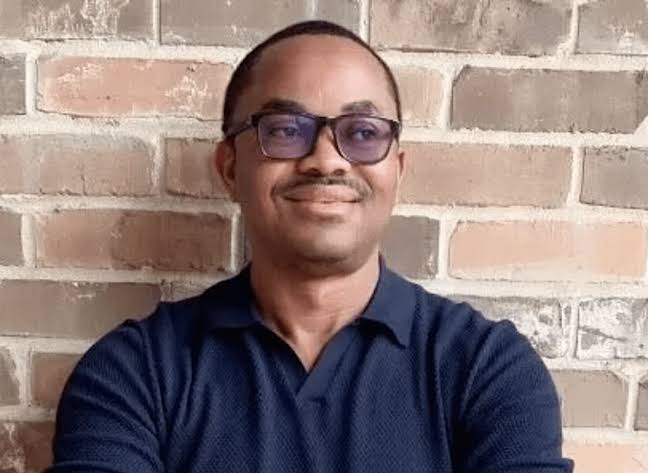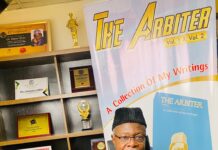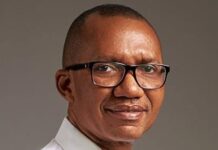The courage to be wrong, by Osmund Agbo
Growing up, I was raised with an inquisitive mind, one that gave preeminence to the solid ground of logic and reason over superstition. My father, an unapologetic contrarian, never preached rebellion, nor did he lecture us on belief. But in the quiet consistency of his life, he modeled something radically different: the courage to stand apart, to question inherited truths, and, most importantly, to be wrong.
I do not mean wrong in the reckless sense, but wrong in the way a scientist proposes a hypothesis: knowing it may be disproved, yet forging ahead because inquiry itself is noble. As I reflect on his legacy and my own evolving worldview, I have come to realize this: wise men dare to be wrong because they understand that truth lives not in certainty, but in the unrelenting pursuit of it.
My father’s rejection of local superstitions, rainmaking, divinations, and the mystical infrastructure that buttressed some traditional beliefs, was not born out of arrogance but of principle. He once refused to contribute to a village fund meant to pay a rainmaker, a decision that earned him some kind of social ostracism. He never explained himself, never railed against the beliefs of others, and certainly never asked his children to follow suit. But we did. Quietly, inevitably, we followed the example of a man who lived by his convictions.
READ ALSO: Why we still turn to religion, by Osmund Agbo
This story is more than a tale of a lone man resisting cultural pressure. It underscores a vital philosophical stance: that truth is not always where the majority stands, and that progress often begins with a single voice dissenting from the chorus. Wisdom, therefore, is not the accumulation of correct answers but the discernment to ask uncomfortable questions and the humility to be wrong in the process.
At its core, this way of thinking demands a deep understanding of perception and its limitations. Maurice Merleau-Ponty, the French phenomenologist, reminds us that “All consciousness is perceptual… The perceived world is the presupposed foundation of all rationality, all value, and all existence.”
This idea places perception, not facts at the very origin of human understanding.
A loud bang means one thing to a soldier and something entirely different to a child at a birthday party. For the soldier, perhaps recently returned from a war zone, that sudden noise might trigger a flood of adrenaline, a defensive reflex honed by months or years of surviving under threat. It might conjure memories of IEDs or firefights, not as distant recollections but as visceral, bodily experiences.
To the child, however, the same bang may spark joy, signaling the bursting of a balloon, the lighting of fireworks, or the arrival of a surprise, something safe, even magical.
The sound itself, its decibels, duration, and physical properties, does not change. It is objectively the same stimulus. But its meaning is radically different, not because of the sound, but because of the hearer. What transforms neutral data into significance is the filter of personal history, culture, emotion, and expectation. This is the essence of perception.
We are not blank slates receiving reality as it is; we are dynamic interpreters constantly translating the world through the lens of who we are, where we’ve been, and what we believe. In simpler terms, we do not see the world as it is; we see the world as we are.
READ ALSO: My Joesy: A dreamer’s heart, a warrior’s soul, by Osmund Agbo
Understanding this is not just an exercise in empathy, it is a gateway to wisdom. It reminds us that others may not be wrong just because they see things differently; they may simply be seeing through a different set of eyes, shaped by experiences we do not share. It calls us to be slow to judge and quick to listen. And it invites us to question our own assumptions, knowing that what we consider “truth” might, in fact, be only ourtruth, limited, partial, and contingent
The implications of this are profound. If perception is shaped by culture, emotion, memory, and context, then wisdom lies not in clinging to our version of truth but in recognizing that it is a version. It takes courage to admit this, especially in a world that rewards certainty and punishes doubt. But this is exactly why wise men dare to be wrong. They understand that embracing the possibility of error is not a weakness; it is a strength. To dare to be wrong is to remain teachable.
There is an old saying in Zen philosophy: “When the student is ready, the teacher will appear.” This doesn’t mean that wisdom is hiding, waiting to pounce when we’ve finally matured. Rather, it suggests that wisdom surrounds us all the time, but only those who empty themselves of ego, of false certainty, can recognize it when it arrives. The readiness of the student lies in their willingness to say, “I don’t know.”
This is what set my father apart. He didn’t just reject superstition; he rejected the comfort of certainty. He chose instead the difficult path of constant questioning. In retrospect, it’s clear that his refusal to pay the rainmaker was not just skepticism; it was a philosophical stance: one that affirmed reality as independent from belief and challenged others to reassess the difference between tradition and truth.
There is, of course, a cost to this kind of intellectual integrity. The path of the wise contrarian is lonely. As the saying goes, “If you stray too far from the group, you risk getting left behind.” Social animals that we are, humans find solace in the herd. Conformity feels safe. But wisdom often requires walking alone, at least for a time.
And yet, this apparent isolation conceals a deeper connection to truth and to the future. Today’s contrarian is often tomorrow’s prophet. What was once heresy becomes doctrine; what was once ridicule becomes recognition. Galileo dared to be wrong in the eyes of the Church. Socrates dared to question Athenian morality and paid with his life. Mandela dared to dream of racial equality in apartheid South Africa.
History has a curious habit of vindicating those who dared to speak when silence was safer. But even if vindication never comes, the daring itself is still worthwhile. Because to dare to be wrong is to live authentically, to remain open to transformation, to keep refining one’s map of the world in search of deeper clarity.
READ ALSO: Chitty Chitty Bang Bang and Africa’s Impala Generation, by Osmund Agbo
There is a difference between being wrong and daring to be wrong. The former is a passive state; the latter is an active choice. It’s the choice to test assumptions, to challenge consensus, and to recognize the impermanence of knowledge. It is the philosophical equivalent of sailing without a map, guided instead by the stars of principle, integrity, and curiosity.
This attitude is not antithetical to faith or culture, but it insists that both must be examined. Culture is not infallible. Religion is not beyond critique. Even the most sacred beliefs must face the scrutiny of reason. Otherwise, we risk trading the freedom of thought for the comfort of dogma.
Wise men dare to be wrong not because they enjoy conflict, but because they revere truth. And truth, like a mountain peak, is approached step by step, through trial, error, humility, and relentless ascent.
Today, I find myself wearing my father’s shoes. Not because I chose to mimic him, but because life, in its quiet way, nudged me toward the same posture. I no longer see his choices as rebellion. I see them as wisdom clothed in quiet resistance. And though one sometimes feel the sting of being misunderstood, I now understand that the courage to stand alone is the precondition for ever truly belonging.
In an era where algorithms feed us only what we already agree with, and echo chambers amplify our certainties, the courage to be wrong has never been more important. It is the antidote to intellectual laziness, the foundation of meaningful dialogue, and the doorway to wisdom.
Let the others pay the rainmaker if they must. Let them clothe us in the garb of stubbornness, strangeness, or error. If being wrong means remaining open to what is real, then may we always dare to be wrong and may we find in that daring the beginning of truth.
Osmund Agbo is a medical doctor and author. His works include, Black Grit, White Knuckles: The Philosophy of Black Renaissance and a fiction work titled The Velvet Court: Courtesan Chronicles. His latest works, Pray, Let the Shaman Die and Ma’am, I Do Not Come to You for Love, have just been released.
Thank you sir
Follow the Neptune Prime channel on WhatsApp:
Do you have breaking news, interview request, opinion, suggestion, or want your event covered? Email us at neptuneprime2233@gmail.com





